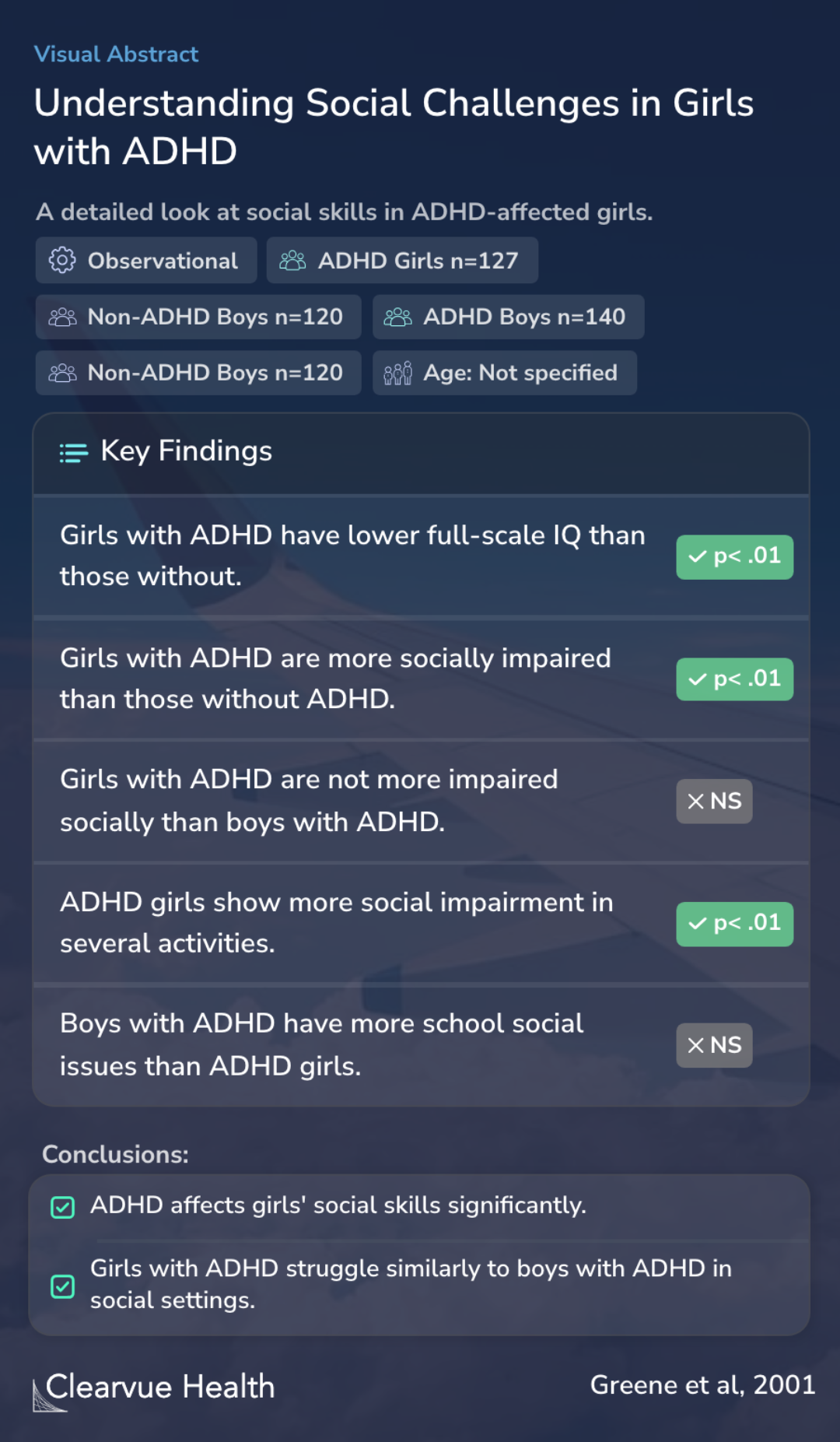Social impairment in girls with ADHD: patterns, gender comparisons, and correlates
Quantifying Social Challenges in Girls with ADHD
Greene RW, Biederman J, Faraone SV, Monuteaux MC, Mick E, DuPre EP, Fine CS, Goring JC

Objectives
The paper delved into the social challenges faced by girls diagnosed with attention-deficit/hyperactivity disorder (ADHD). It sought to draw a comparison between the social abilities of boys and girls who have ADHD and to uncover how social difficulties might be connected with other conditions that often occur alongside ADHD.
To investigate social impairment in girls with attention-deficit/hyperactivity disorder (ADHD), compare the social functioning of boys and girls with ADHD, and explore the association between social dysfunction and conditions comorbid with ADHD.
Methods
In the investigation, researchers studied four distinct groups of children: 267 youngsters (including 127 girls) with ADHD and 234 children without ADHD (of which 114 were girls). The aim was to analyze and compare their social interactions, psychological health, and basic demographic details. The study provided a detailed examination of social skills, specifically in girls affected by ADHD, utilizing observational methods to gather data on a total of 127 girls with ADHD, 120 boys without ADHD, and 140 boys with ADHD, without specifying their ages.
Four groups of index children were studied: 267 children (127 girls) with ADHD and 234 non-ADHD comparison children (114 girls). Groups were compared on social functioning, psychopathology, and demographic characteristics.
Results
The findings revealed that girls with ADHD face significant hurdles in forming and maintaining personal relationships compared to girls without ADHD. Interestingly, the level of social difficulty observed in girls with ADHD was found to be on par with that of boys with ADHD. The study identified ADHD and other co-occurring disorders as key factors influencing particular aspects of social challenges in both boys and girls with ADHD. Key insights from the study include that girls with ADHD generally have a lower full-scale IQ than those without ADHD and exhibit more social challenges in various activities, although they do not face more school-related social issues than boys with ADHD.
Girls with ADHD manifested significant deficits in interpersonal functioning compared with girls without ADHD and evidenced a similar degree of social impairment compared with boys with ADHD. ADHD and associated comorbid disorders were significant correlates of specific domains of social...
Conclusions
Interpersonal difficulties are a significant aspect of ADHD, affecting both boys and girls alike. These challenges are primarily linked to the behaviors typical of ADHD and those associated with other concurrent conditions. The study underscores that ADHD significantly impacts the social abilities of girls, placing them in a similar position to boys with ADHD when it comes to navigating social situations.
Interpersonal deficits are a major correlate of ADHD, irrespective of gender, and appear to stem from the behaviors associated with ADHD as well as behaviors characteristic of conditions comorbid with ADHD.
Key Takeaways
Context
The current study's findings regarding the social impairments in girls with ADHD contribute to a broader understanding of ADHD's impact on social interactions. This is particularly relevant in light of Shaw-Zirt et al.'s (2005) study, which showed that ADHD symptoms could lead to lower self-esteem and difficulty adjusting socially and academically among college students.
Furthermore, the study by Antshel and Remer (2003) highlights the potential of social skills training to improve assertiveness, cooperation, and empathy in children with ADHD, suggesting a proactive approach to addressing the social challenges identified in the current research.